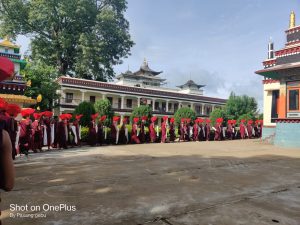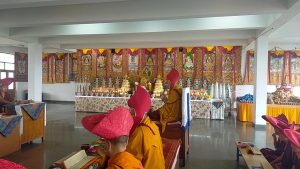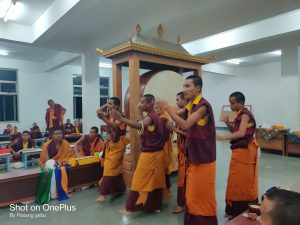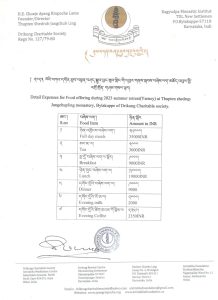Yarney, or the annual summer retreat, has begun at Ayang Rinpoche’s monastery in Bylakuppe, India. This is a tradition that goes back to the time of Buddha. Its purpose was to allow monks to gather and shelter from the monsoon rains and to take time to reflect, pray, meditate, and listen to the dharma. During Buddha’s time, the summer retreat was three months long: by staying in a single location for the duration of the rainy season, the monks avoided the increased likelihood of walking on and harming many insects and other small beings that reproduce during the rainy season.
At Thubten Shedrup Jangchupling, Yarney starts on the full moon of the sixth month of the lunar calendar and is held for 45 days, concluding on the new moon of the seventh month of the lunar calendar, August 1 to September 14.
The first day of the Yarney begins with the Sojong vows. Sojong is a practice for purifying and repairing broken vows to replenish positive virtues. “So” means “to restore” and “Jong” means “to purify”; in other words, to clear away negative karma and harmful deeds. Apart from Sojong, monks also observe other special monastic vows and restrictions. Khenpos take turns giving short teachings on the importance of the three ground practices of the summer retreat.
To restore broken Pratimoksha vows, the ordained sangha members traditionally practice Sojong bi-monthly. Some lay Buddhists regularly observe this purification practice too. The “Yar-khelen” vows are taken with special vase used for purification called “chab-lug”. The wooden monastic bell called Gendi (used only for Yarney and Sojong since the time of Buddha) is rung to call for lunch and morning prayers.
The monks take breakfast and lunch in the temple with the traditional monks’ begging bowl called Lhungdze. All the monks, excluding those with health issues, take a vow not to eat at night in accordance with the Vinaya tradition. Every evening, Aspiration prayers (monlam) are recited.
Every Saturdays, there are philosophy discussions and debate on Sundays. Khenpos and Lopons hold question-answer sessions on particular subject, the monks choose.
It is during Yarney that the monks also sit for their half-yearly examination. Hence, apart from the fixed Yarney programs, they are quite busy with their debate, commentary and essay writing tests that will count in their final scores.
In the evening, there are prayers, followed by the traditional ceremonial rice made with butter and dry fruits. Selected monks give dharma talks on specific subjects and display their philosophical debate skills. During the debate, one group establishes a philosophical view while the other tries to defeat them with sharp logic and quick verbal attacks. Since there are strong emotions displayed, watching them leads to lots of laughter and fun for the rest of the monks.

On the morning of the last day of Yarney called Gaye, the monks conclude the summer retreat by wearing their best robes and circumambulating the Amitabha and Achi Temples. Then, for the next three days, the monks have a party at the specially designated summer retreat picnic spot that is adjacent to the monastery. They get busy in all sorts of games and entertainment, appropriate for their age groups.
Another benefit of the retreat is that it gives faithful patrons an opportunity to accumulate merit. It is considered very important for lay people to participate in these virtuous activities through actions such as making offerings for shrine expenses and sponsoring tea and special meals for the sangha.
Shrine offering Items : Flowers, Incense, Rice, Serkyem (Dharmapala offerings), Barley flour for Tormas, Butter lamps, etc $ 500 for whole Yarney period.
Tea offering for monks: $ 36 for one day
Meals for monks: $ 420 all meals for one day (Breakfast $ 108, Lunch $ 228, Dinner $108)
Evening milk: $24; Evening coffee: $28
Sangha Offering: No fixed amount. Traditionally, Rinpoches, Khenpos, Lopons, chanting masters, ritual masters and disciplinarians are offered extra in addition to the offerings made to the regular monks.
You may dedicate your offering to loved ones, living or deceased. Please send by September 12th to be included on the prayer list.
Make US-tax-deductible donations through the Amitabha Foundation USA by check (payable to Amitabha Foundation, mailed to P.O. Box 2572, Aptos, CA 95076), or online. Donations may also be made directly to Drikung Charitable Society or through the Amitabha Foundation branch in your own country.



